
When Problem-Solving Is A Problem
Problem-solving is a critical skill in the world of leadership training and development. Leaders are expected to tackle complex issues, make tough decisions, and navigate their organizations through uncertain terrain. However, there can be instances when the very problem-solving skills that leaders rely on become problematic. This paradoxical situation often arises due to various factors, and in this article, we will explore when problem-solving becomes a problem in the context of leadership training.
The Complexity of Leadership Problem-Solving
Leadership problem-solving involves addressing multifaceted challenges that can range from organizational issues to interpersonal conflicts. Effective leaders must analyze situations, identify root causes, and implement solutions that align with their organization's goals. In many cases, they are expected to do so under pressure and with limited time and resources.
However, there are situations where problem-solving can hinder rather than help the development of leaders. Here are some common scenarios where problem-solving becomes problematic:
Overreliance on One Approach:
Some leaders become overly reliant on a single problem-solving approach or technique that has worked for them in the past. While it's essential to have a toolbox of effective methods, sticking rigidly to one method can stifle creativity and limit the exploration of innovative solutions.
Micromanagement:
Leaders who excel at problem-solving and have completed their Leadership Skills Development Training may fall into the trap of micromanagement. They may believe that they are the only ones capable of finding solutions and, as a result, may fail to delegate responsibilities or trust their teams to solve problems independently.
Perfectionism:
Perfectionism can be a double-edged sword. While it drives leaders to seek optimal solutions, it can also lead to procrastination and analysis paralysis. Leaders who demand perfection in every decision may find themselves stuck in a perpetual cycle of problem analysis without taking meaningful action.
Failure to Foster Growth:
Leaders who are adept problem solvers may inadvertently inhibit the growth of their team members. When leaders always provide solutions, team members may become dependent on them rather than developing their own problem-solving skills. However, they have to give their team members the chance to showcase their skills. Only this way better Leadership Development eLearning would take place in the organization.
Ignoring Emotional Intelligence:
Effective leadership is not just about solving problems logically; it also requires a high degree of emotional intelligence. Leaders who neglect the emotional aspects of problem-solving, such as managing conflicts or empathizing with team members, may find their leadership skills lacking in critical areas.
Addressing the Challenges
Although these challenges might appear formidable, they are not impossible to overcome. Leaders and organizations can take proactive steps to ensure that problem-solving skills enhance rather than hinder leadership development.
Diversify Problem-Solving Approaches:
Encourage leaders to explore various problem-solving approaches, from analytical to creative methods. Emphasize the importance of adapting strategies to suit the specific nature of each challenge.
Promote Delegation:
Leaders should be encouraged to delegate problem-solving tasks to capable team members. Delegation not only lightens the leader's workload but also fosters a sense of ownership and skill development through Leadership Skills Development Training among team members.
Set Realistic Expectations:
Help leaders understand that perfection is rarely attainable in complex problem-solving scenarios. Encourage them to focus on achieving practical, effective solutions rather than striving for an unattainable ideal.
Coach Emotional Intelligence:
Leadership training and development should include modules on emotional intelligence and its role in effective problem-solving. Leaders need to recognize that addressing emotions, both their own and those of others, is a crucial aspect of successful leadership.
Encourage a Growth Mindset:
Promote the idea that leaders should view mistakes and failures as opportunities for growth. A growth mindset encourages continuous learning and resilience in the face of challenges.
Peer Learning and Collaboration:
Create a culture of collaboration where leaders can learn from one another. Peer discussions and knowledge-sharing can expose leaders to different problem-solving styles and strategies.
Parting Thoughts
Problem-solving is undoubtedly a critical skill in leadership skills development training. However, it can become problematic when leaders over-rely on specific approaches, fail to delegate, chase perfection, neglect emotional intelligence, and hinder team growth. To overcome these challenges, leaders and organizations must take a proactive approach to diversify problem-solving strategies, promote delegation, set realistic expectations, coach emotional intelligence, encourage a growth mindset, and foster collaboration.
In a world where leadership demands agility and adaptability, leaders must strike a balance between their problem-solving prowess and the ability to nurture their teams, ultimately fostering a new generation of leaders who can tackle challenges effectively while empowering others to do the same.
